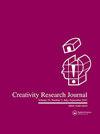孵化对发散思维的益处
IF 2.5
3区 心理学
Q2 PSYCHOLOGY, EDUCATIONAL
引用次数: 2
摘要
关于发散性思维任务第一集中提供的固定线索是否会影响孵化后的创造性结果,正如它们对趋同性问题解决任务所做的那样,研究仍然有限。本研究采用延迟和即时孵育范式考察了孵育的有益效果。实验1中的参与者在一种新型发散性思维任务的第一集中被提供或没有被提供注视线索,类似于在情节故事中创造标题。结果表明,固定提示调节了人们在孵育后的创造性结果。经过孵育并没有提高参与者在第二次强注视提示时的创造力。相比之下,在较弱的注视线索条件下,潜伏期导致第二阶段产生更多不同的项目,这导致了在没有注视线索的情况下的表现。实验2的结果表明,即时孵育降低了注视线索的影响。因此,如果人们想要通过一段时间的孵化来促进他们的创造力,结果可能仍然取决于创作作品所处的环境条件。本文章由计算机程序翻译,如有差异,请以英文原文为准。
Benefits of Incubation on Divergent Thinking
Studies on whether fixation cues provided in the first episode of divergent thinking tasks influence creative outcomes after incubation, as they do for convergent problem-solving tasks, remain limited. This research examined the beneficial effects of incubation using the delayed- and immediate-incubation paradigms. Participants in Experiment 1 were either provided or not provided fixation cues during the first episode of a new type of divergent-thinking task, similar to creating titles in plot stories. The results indicated that fixation cues moderated people’s creative outcomes after incubation. Going through incubation did not improve the participants’ creativity in the second episode for strong fixation cues. By contrast, an incubation period led to the generation of more divergent items in the second episode compared to the first episode for less strong fixation cues, and this led to the performance matching the condition without fixation cues. The results from Experiment 2 suggested that immediate incubation downsized the influence of fixation cues. Therefore, if people want to promote their creativity through a period of incubation, the outcomes may still depend on the conditions of environments in which the creative works are executed.
求助全文
通过发布文献求助,成功后即可免费获取论文全文。
去求助
来源期刊

Creativity Research Journal
Multiple-
CiteScore
5.10
自引率
7.70%
发文量
52
期刊介绍:
Creativity Research Journal publishes high-quality, scholarly research capturing the full range of approaches to the study of creativity--behavioral, clinical, cognitive, crosscultural, developmental, educational, genetic, organizational, psychoanalytic, psychometrics, and social. Interdisciplinary research is also published, as is research within specific domains (e.g., art, science) and research on critical issues (e.g., aesthetics, genius, imagery, imagination, incubation, insight, intuition, metaphor, play, problem finding and solving). Integrative literature reviews and theoretical pieces that appreciate empirical work are extremely welcome, but purely speculative articles are not published. Readers are encouraged to send commentaries, comments, and evaluative book reviews.
 求助内容:
求助内容: 应助结果提醒方式:
应助结果提醒方式:


